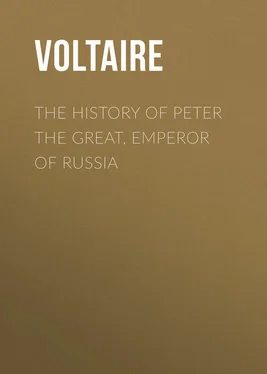Voltaire - The History of Peter the Great, Emperor of Russia
Здесь есть возможность читать онлайн «Voltaire - The History of Peter the Great, Emperor of Russia» — ознакомительный отрывок электронной книги совершенно бесплатно, а после прочтения отрывка купить полную версию. В некоторых случаях можно слушать аудио, скачать через торрент в формате fb2 и присутствует краткое содержание. Жанр: История, literature_18, foreign_prose, на английском языке. Описание произведения, (предисловие) а так же отзывы посетителей доступны на портале библиотеки ЛибКат.
- Название:The History of Peter the Great, Emperor of Russia
- Автор:
- Жанр:
- Год:неизвестен
- ISBN:нет данных
- Рейтинг книги:3 / 5. Голосов: 1
-
Избранное:Добавить в избранное
- Отзывы:
-
Ваша оценка:
- 60
- 1
- 2
- 3
- 4
- 5
The History of Peter the Great, Emperor of Russia: краткое содержание, описание и аннотация
Предлагаем к чтению аннотацию, описание, краткое содержание или предисловие (зависит от того, что написал сам автор книги «The History of Peter the Great, Emperor of Russia»). Если вы не нашли необходимую информацию о книге — напишите в комментариях, мы постараемся отыскать её.
The History of Peter the Great, Emperor of Russia — читать онлайн ознакомительный отрывок
Ниже представлен текст книги, разбитый по страницам. Система сохранения места последней прочитанной страницы, позволяет с удобством читать онлайн бесплатно книгу «The History of Peter the Great, Emperor of Russia», без необходимости каждый раз заново искать на чём Вы остановились. Поставьте закладку, и сможете в любой момент перейти на страницу, на которой закончили чтение.
Интервал:
Закладка:
Russia had experienced some previous disturbances on occasion of a dispute, whether the sign of the cross was to be made with three fingers, or with two! One Abakum, who was also a priest, had set up some new tenets at Moscow, in regard to the Holy Spirit; which according to the Scriptures, enlightened all the faithful; as likewise with respect to the equality of the primitive Christians, and these words of Christ: – 'There shall be amongst you neither first nor last.' Several citizens and many of the strelitzes, embraced the opinions of Abakum. One Raspop 22 22 Here M. de Voltaire seems to have greatly mistaken the sense of this word. Raspop not being a proper name, in which sense he takes it, but signifies a degraded priest.
was the chief of this party, which became considerable. The sectaries, at length, entered (July 16, 1682, new stile) the cathedral, where the patriarch and his clergy were officiating; drove them out of the church with stones, and seated themselves very devoutly in their places, to receive the Holy Spirit. They called the patriarch the 'ravenous wolf in the sheepfold;' a title which all sects have liberally bestowed on each other. The princess Sophia, and the two czars, were immediately made acquainted with these disturbances: and the other strelitzes, who were staunch to the good old cause, were given to understand, that the czars and the church were in danger. Upon this the strelitzes and burghers of the patriarchal party attacked the Abakumists: but a stop was put to the carnage, by publishing a convocation of a council, which was immediately assembled in a hall of the palace. This took up very little time, for they obliged every priest they met to attend. The patriarch, and a bishop, disputed against Raspop; but at the second syllogism, they began to throw stones at one another. The council ended with ordering Raspop, and some of his faithful disciples to have their heads struck off; and the sentence was executed by the sole order of the three sovereigns, Sophia, John, and Peter.
During these troubles, there was a knez, named Chowanskoi, who having been instrumental in raising the princess Sophia to the dignity she then held, wanted, as a reward for his services, to have a share in the administration.
It may be supposed, that he found Sophia not so grateful as he could wish; upon which he espoused the cause of religion, and the persecuted Raspopians, and stirred up a party among the strelitzes and the people, in defence of God's name.
This conspiracy proved a more serious affair than the enthusiastic riot of Raspop. An ambitious hypocrite always carries things farther than a simple fanatic. Chowanskoi aimed at no less than the imperial dignity; and to rid himself of all cause of fear, he resolved to murder the two czars, Sophia, the other princesses, and every one who was attached to the imperial family. The czars and the princesses were obliged to retire to the monastery of the Holy Trinity, within twelve leagues of Petersburg. 23 23 We suppose the author means Moscow.
This was, at the same time, a convent, a palace, and a fortress, like Mount Cassino, 24 24 Or Cossano, a small town and abbey in the Milanese. On the Adda, near this place, an obstinate battle was fought between the Germans and French, in 1705, when prince Eugene defeated the duke of Vendome.
Corhy, 25 25 A town and abbey on the borders of Westphalia, in Germany; the abbot of which is a sovereign prince, and has a seat in the imperial diet.
Fulda, 26 26 Or Fuld, a town and abbey of Hesse, in Germany; situate on a river of the same name. It is governed by an abbot, who is a prince of the empire.
Kempten, 27 27 An imperial city of Suabia, in Germany, situate on the Ifar.
and several others belonging to the Latin church. This monastery of the Trinity belongs to the monks of St. Basil. It is surrounded by deep ditches, and ramparts of brick, on which is planted a numerous artillery. The monks are possessed of all the country round for four leagues. The imperial family were in full safety there, but more on account of the strength, than the sanctity of the place. Here Sophia treated with the rebel knez; and having decoyed him half way, caused his head to be struck off, together with those of one of his sons, and thirty-seven strelitzes who accompanied him.
1682.
The body of strelitzes upon this news, fly to arms, and march to attack the convent of Trinity, threatening to destroy every thing that came in their way. The imperial family stood upon their defence; the boyards arm their vassals, all the gentlemen flocked in, and a bloody civil war seemed on the point of beginning. The patriarch somewhat pacified the strelitzes, who began to be intimidated with the number of troops that were marching towards them on all sides: in short, their fury was changed into fear, and their fear into the most abject submission; a change common to the multitude. Three thousand seven hundred of this corps, followed by their wives and children, with ropes tied about their necks, went in procession to the convent of the Trinity, which three days before they had threatened to burn to the ground. In this condition, these unhappy wretches present themselves before the gate of the convent, two by two, one carrying a block and another an axe; and prostrating themselves on the ground, waited for their sentence. They were pardoned upon their submission, and returned back to Moscow, blessing their sovereigns; and still disposed, though unknown to themselves, to commit the same crime upon the very first opportunity.
These commotions being subsided, the state resumed an exterior of tranquillity; but Sophia still remained possessed of the chief authority, leaving John to his incapacity, and keeping Peter in the subjection of a ward. In order to strengthen her power, she shared it with Prince Basil Galitzin, whom she created generalissimo, minister of state, and lord keeper. Galitzin was in every respect superior to any person in that distracted court: he was polite, magnificent, full of great designs, more learned than any of his countrymen, as having received a much better education, and was even master of the Latin tongue, which was, at that time, almost entirely unknown in Russia. He was of an active and indefatigable spirit, had a genius superior to the times he lived in, and capable, had he had leisure and power, as he had inclination, to have changed the face of things in Russia. This is the eulogium given of him by La Neuville, at that time the Polish envoy in Russia; and the encomiums of foreigners are seldom to be suspected.
This minister bridled the insolence of the strelitzes, by distributing the most mutinous of that body among the several regiments in the Ukraine, in Casan, and Siberia. It was under his administration that the Poles, long the rivals of Russia, gave up, in 1686, all pretensions to the large provinces of Smolensko and the Ukraine. He was the first who sent an embassy to France, in 1687; a country which had, for upwards of twenty years, been in the zenith of its glory, by the conquests, new establishments, and the magnificence of Lewis XIV. and especially by the improvement of the arts, there can be not only external grandeur, but solid glory. France had not then entered into any correspondence with Russia, or rather was unacquainted with that empire; and the academy of inscriptions ordered a medal to be struck to commemorate this embassy, as if it had come from the most distant part of the Indies; but notwithstanding all this, the ambassador Dolgorouski miscarried in his negotiation, and even suffered some gross affronts on account of the behaviour of his domestics, whose mistakes it would have been better to have overlooked; but the court of Lewis XIV. could not then foresee, that France and Russia would one day reckon among the number of their advantages, that of being cemented by the closest union.
Читать дальшеИнтервал:
Закладка:
Похожие книги на «The History of Peter the Great, Emperor of Russia»
Представляем Вашему вниманию похожие книги на «The History of Peter the Great, Emperor of Russia» списком для выбора. Мы отобрали схожую по названию и смыслу литературу в надежде предоставить читателям больше вариантов отыскать новые, интересные, ещё непрочитанные произведения.
Обсуждение, отзывы о книге «The History of Peter the Great, Emperor of Russia» и просто собственные мнения читателей. Оставьте ваши комментарии, напишите, что Вы думаете о произведении, его смысле или главных героях. Укажите что конкретно понравилось, а что нет, и почему Вы так считаете.












